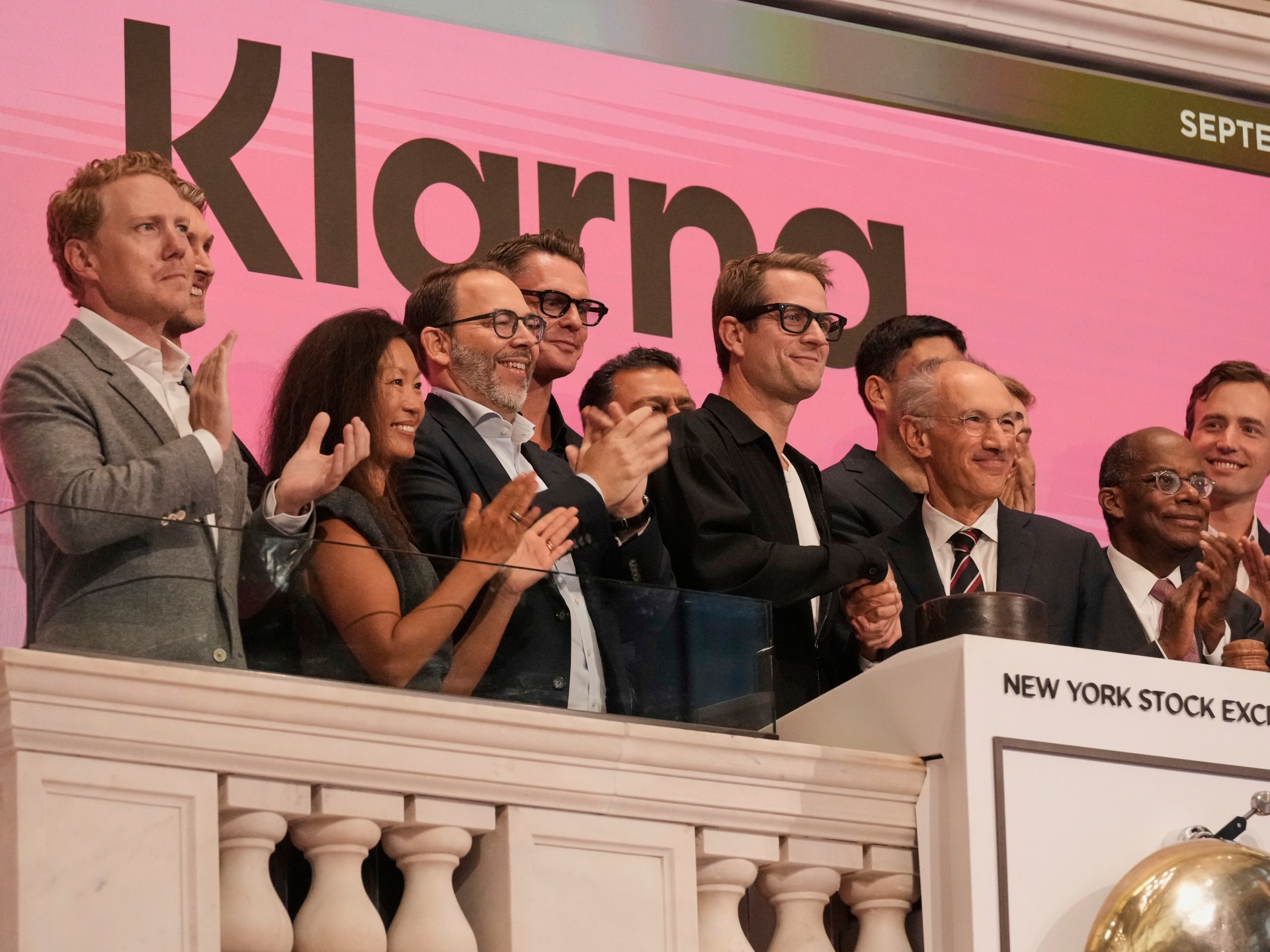Klarna, the Swedish buy-now-pay-later company, has made its highly anticipated public debut on the New York Stock Exchange (NYSE), the latest in a run of high-profile initial public offerings this year.
Klarna sold 34.3 million shares to investors at $40 a share late on Tuesday and was listed on the exchange on Wednesday. That is above the forecasted range of $35 to $37 a share and values the company at more than $15bn.
Recommended Stories
list of 4 itemsend of list
Shares of Klarna opened 30 percent above their offer price in their NYSE debut on Wednesday, giving the Swedish fintech a valuation of $19.65bn.
The amount of money raised in Klarna’s initial public offering, approximately $1.37bn, is the largest IPO this year, according to Renaissance Capital. That’s notable because 2025 has been one of the busier years for companies going public.
Other IPOs this year include the design software company Figma and Circle Internet Group, which issues the USDC stablecoin. Investors are also looking forward to the expected market debuts of the ticket exchange StubHub and the cryptocurrency exchange Gemini, which is majority-owned by twins Cameron and Tyler Winklevoss.
Founded in 2005 as a payments company, Klarna entered the United States buy-now-pay-later market in 2015 in partnership with department store operator Macy’s. Since then, Klarna has expanded to hundreds of thousands of merchants and embedded itself in internet browsers and digital wallets as an alternative to credit cards. The company recently announced a partnership with Walmart.
Klarna will trade under the symbol “KLAR.” While the company was founded in Sweden and is a popular payment service in Europe, company executives said they made the decision to go public in the US as a signal that Klarna’s future growth opportunities lay with the US shopper.
“It’s the largest consumer market in the world, and it’s the biggest credit card market in the world. It’s a tremendous opportunity, from our perspective,” said CEO and co-founder Sebastian Siemiatkowski in an interview with The Associated Press ahead of the IPO.
Over the years and in multiple interviews, Siemiatkowski has made it clear that Klarna wants to steal away customers from the big credit card companies and sees credit cards as a high-interest, exploitative product that consumers rarely use correctly.
Split purchases
Klarna’s most popular product is what’s known as a “pay-in-4” plan, where a customer can split a purchase into four payments spread over six weeks. The company also offers a longer-term payment plan where it charges interest. The business model has caught on globally, particularly among consumers who are reluctant to use credit cards. The company said 111 million consumers worldwide have used Klarna.
Klarna and other buy-now-pay-later companies have attracted increased public interest in recent years as the business model has caught on. State and federal regulators, as well as consumer groups, have expressed some degree of worry that consumers may overextend themselves financially on buy-now-pay-later loans just as much as they do with credit cards.
Siemiatkowski says the company is actively monitoring how consumers use their products, and the average balance of Klarna users is less than $100. Because the company issues loans that are six weeks or less, Klarna argues it can more easily adjust its underwriting standard depending on economic conditions.
Klarna reported second-quarter revenue of $823m in August before going public and said that it had an adjusted profit of $29m. The delinquency rate on Klarna’s “pay-in-4” loans is 0.89 percent, and on its longer-term loans for bigger purchases, the delinquency rate is 2.23 percent. Those figures are below the average 30-day delinquency rates on a credit card.
Klarna will now be the second-largest buy-now-pay-later company by market capitalisation behind Affirm. Shares of Affirm have surged more than 40 percent so far this year, putting the value of the US-based company around $28bn, helped by a belief among investors that buy-now-pay-later companies may take away market share from traditional banks and credit cards. Affirm fell slightly on Wednesday.
Source: Aljazeera

Leave a Reply